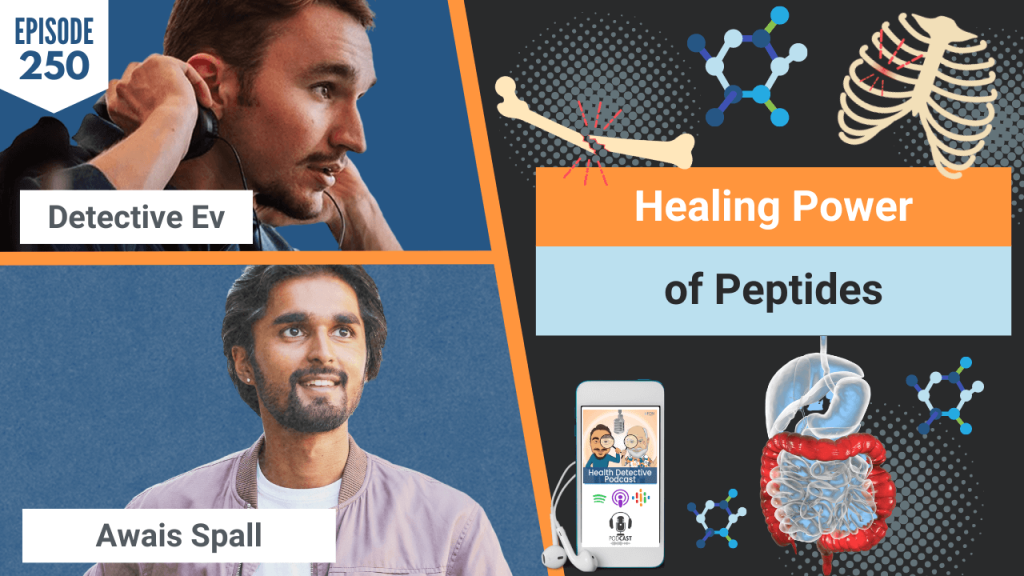Introduction
[00:00:00] Detective Ev: Well, hello my friends. Welcome back to another episode of the Health Detective Podcast by Functional Diagnostic Nutrition. My name is Evan Transue, aka, Detective Ev. I will be your host for today’s show on peptides.
We are privileged to have with us again, none other than Awais Spall. And I feel so lucky to know this guy. He is probably one of the coolest people you will ever meet, so down to earth, so kind, and he just makes friends with everyone that he talks to. In addition to that, and probably more importantly for today’s show, not that being nice isn’t great, he is a brilliant, brilliant person. He has a wide variety of different knowledge bases in functional medicine and biohacking. And he’s also an FDN practitioner, so we’re very lucky to have him as a part of our crew.
I had him on way back on Episode 75, I will have that in the show notes for you guys and we wanted to bring him on again today. Because what’s funny is I went from having never met this guy on that first episode to now having seen him a bunch of times at different conferences, and he is someone I do consider a friend at this point. So again, lucky to know this guy.
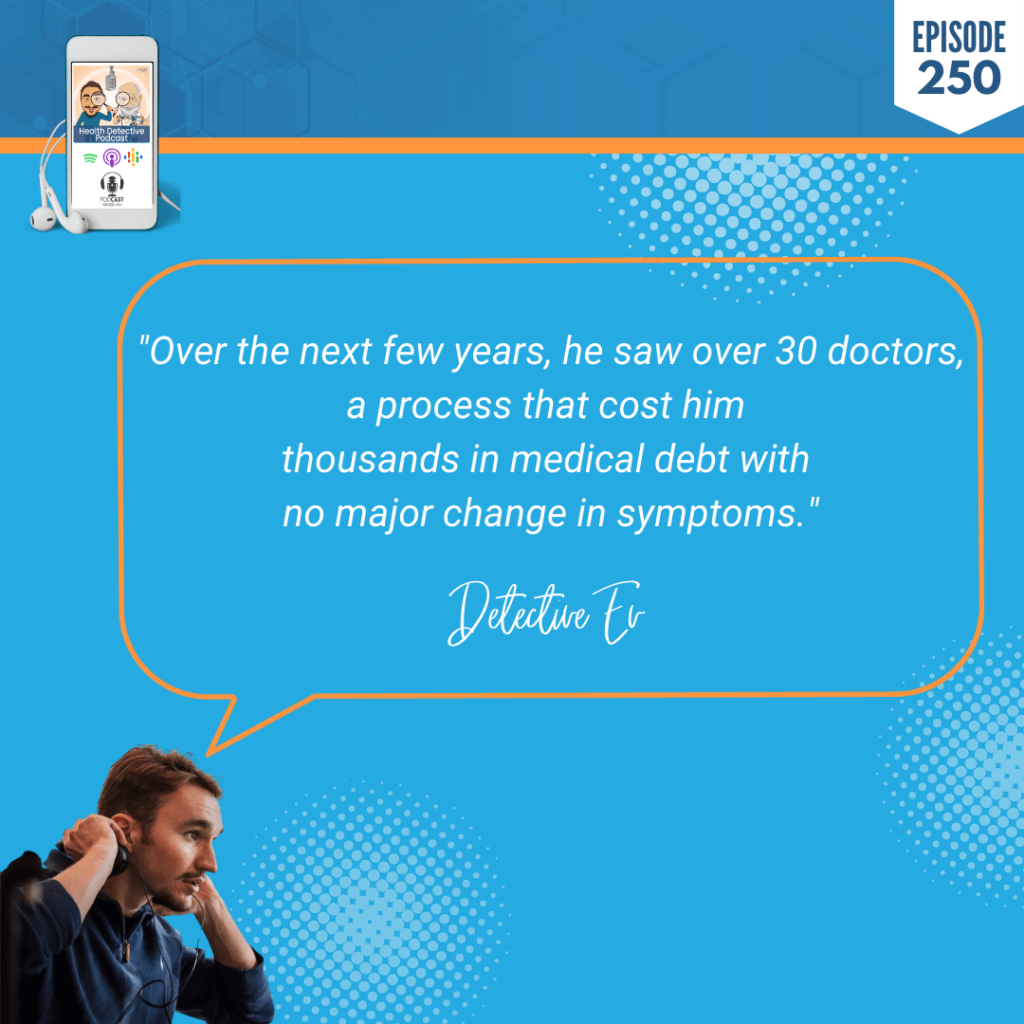
Here is a little bit about him. He is a certified FDN practitioner. About 11 years ago, I think it’s about 12 or 13 now, he began to experience a strange myriad of digestive issues and muscle spasms. He was soon diagnosed with chronic fatigue syndrome and irritable bowel disease. Over the next few years, he saw over 30 doctors, a process that cost him thousands in medical debt with no major change in symptoms.
Peptides: Dramatic Health Improvements
Then in 2017, he decided to take his health into his own hands through the FDN training program. So, he actually went through it at the same time as me and somehow, I didn’t meet this guy until like 2021, 2022. Alongside FDN, he pursued a rigorous study of Ayurveda, which is an ancestral form of healing that holds many keys to wellness.
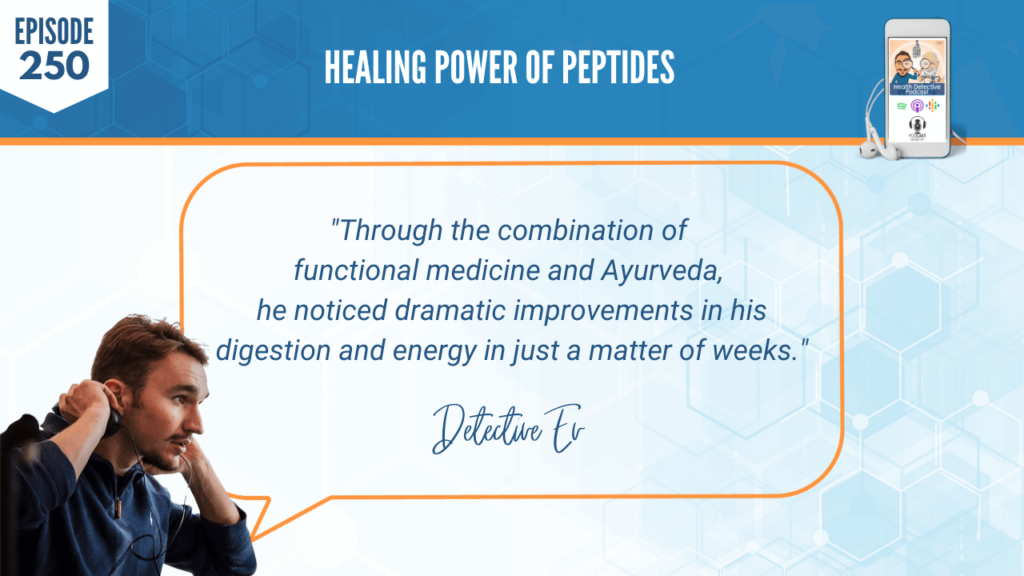
Through the combination of functional medicine and Ayurveda, he noticed dramatic improvements in his digestion and energy in just a matter of weeks. Today, his mission is to share his unique approach to empower those that are suffering and like him are unsatisfied with conventional medicine.
We will be talking about peptides specifically today, cause again, this guy can go in a million different directions with health, but this is what his current area of passion is. He got me pretty excited about this stuff. Without further ado, let’s get to today’s episode.
Alright. Hello there, Awais. Welcome back to the Health Detective Podcast, my friend. How are you?
Awais Spall: It is great to be here.
Detective Ev: I’m glad to have you again. The last time was Episode 75. And what’s so much fun about, I think the functional health community, whatever we’ll call it, then getting to do this podcast is, I remember like the first time I met you and we were having a really cool conversation. We were going more places than just health.
I think we talked about even like religious things and other stuff, but it’s conversations that you would typically be a little more hesitant to have with someone the first time you meet them, let alone come on a podcast. But everything I threw at you, I’m like, oh dang, this dude’s pretty cool.
Peptides: Biohacking and Forward-Thinking
Then we met in person for the first time, and we’ve seen each other quite a few times at conferences now. And man, you and I could talk for hours, right? It’s like we’re just those people that will explore anything as objectively as I guess a human can. We have our biases, but I feel like I could tell you anything about myself and you would respect it. I know you know the opposite is true. So, it’s cool to have you on again.
I would highly recommend you go listen to Awais’s personal health story and his journey in general getting into this. How he went from chemistry to what he’s doing now. Not that it doesn’t involve chemistry to some degree, but that was his actual background. Then he moved into the functional health space. I will have that in the show notes, check it out.
But today we are talking about one of your many love topics. Cause this guy, honestly, is a brilliant man. He really is. I was joking with him before we got on. He’ll always be so respectful, like, have you heard of this doctor? And I’m like, dude, I haven’t heard of 90% of the stuff that you bring up to me. It’s constant research for him. He’s very involved in the space.

I think we agreed on this beforehand that you can almost call what you’re into not only functional medicine, cause he is an FDN practitioner, but you’re into biohacking stuff too. You’re into really forward-thinking protocols and treatments. I know we’re focusing on peptides today but I’m sure, knowing you and me, we’re going to end up swimming into some other topics. We’ll try to start with the peptide thing.
Peptides: Searching for Help
Let’s just begin with, how did you get into that area of study? Because again, you got a million things coming across your plate every month, I’m sure. So, for you to actually be genuinely interested in something to the point where you’ve been studying it for a while, I know that’s an important thing. So, how did you get hooked on this?
[00:04:29] Awais Spall: My interest in peptides started 12 years ago. I had a chronic shoulder injury working out at the gym. It was sort of a genetic thing. I had weak front shoulders and a chronic overuse injury of both my front shoulders, frozen shoulder. So, I couldn’t lift my shoulder beyond my elbows actually for a period of time. It was very severe and terrifying to enter adulthood with that kind of pain.
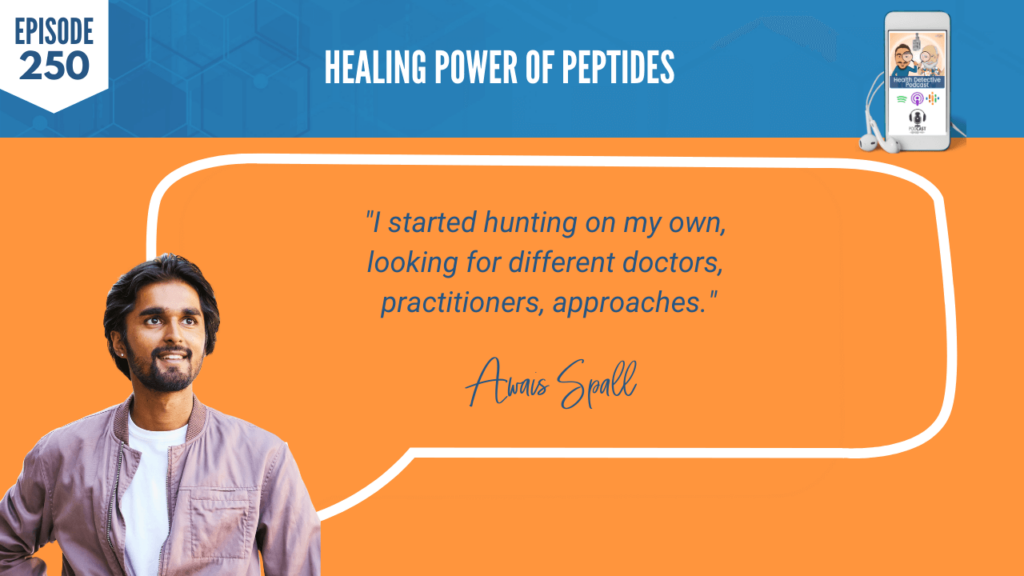
I went to the doctor; they had no solution for me. So, I started hunting on my own, looking for different doctors, practitioners, approaches. And being in LA at the time, a little bit closer to Orange County but still LA, I was able to find regenerative medicine doctors and figure out what I could do for myself and heal my shoulders.
I ended up finding this doctor that was working with a lot of professional athletes. He was working with some, now, very legendary NBA players at the time. It’s actually a funny story. I was really into philosophy and theology at the time, and he was too. We would just go back and forth a lot in our conversations.
It was very hard to afford these things. You can imagine being a new young adult and having expenses with college and stuff like that. I’m just putting stuff on a credit card.
Peptides: Accelerated Healing
He actually started treating me for free or at cost. I just thought that was very kind and generous of him. And then as things weren’t getting better, I started getting PRP Prolozone, really advanced things.
So, he’s like, look, I want to start treating you with the stuff I’m treating my most famous NBA players. He’s like, I’m going to lose money on this. I’m actually going to invest in you cause I think something’s telling me to do that. And he started injecting me with peptides with BPC Sermorelin Acetate locally.

It was incredible how quickly I recovered function, how quickly everything went back to place. I was able to start training again and moving again. Out of everything I had done, so many modalities and interventions at that point, I was like, what is this peptide stuff? It was 12 years ago, like 2010, 2011.
He’s like, it’s the future of medicine. I just started going to him and he printed out a bunch of handouts for me. He’s like, you gotta start reading about this stuff. I was just reading it and like losing my mind. Like, this is too futuristic, this is the future. And he’s like, yeah, something tells me you’re going to get into this at some point. Years later it just kind of was continuing to be a thing for me, and eventually it became something.
It’s become a huge part of my practice now, supporting different doctors, getting peptide education sometimes, sharing protocols and things like that because my experiences goes back so far. Just seeing also how protocols have shifted and stuff like that. I’m just fascinated by the space. I’ve seen it do amazing things. So, that’s kind of in a nutshell.
Peptides: Amino Acid Chains
[00:07:41] Detective Ev: And still interested in it 12 years later. So, I’m kind of excited to dive into this. I’m always very honest on the show where I have my areas of ignorance. And I shouldn’t be but I’m kind of selective in the health space. I know a lot about certain things, and then others, it’s like, if it hasn’t come across my plate as something that I can use, admittedly, it’s a selfish interest. If it hasn’t come across in that way, it’s almost like I don’t know anything about it at all.
I’m hoping today, this is one of the cases where this is useful because my genuine ignorance will probably lead to questions that the audience would want to ask anyway. Let’s start with the basics then. How would we define a peptide? Like what is this that we are injecting into ourselves?
[00:08:20] Awais Spall: So, sometimes they’re injectable, sometimes they’re oral, sometimes they can be topical as well. Sometimes they can be nasal sprays. There’s even sublingual delivery now. There are many routes of delivery for peptides.
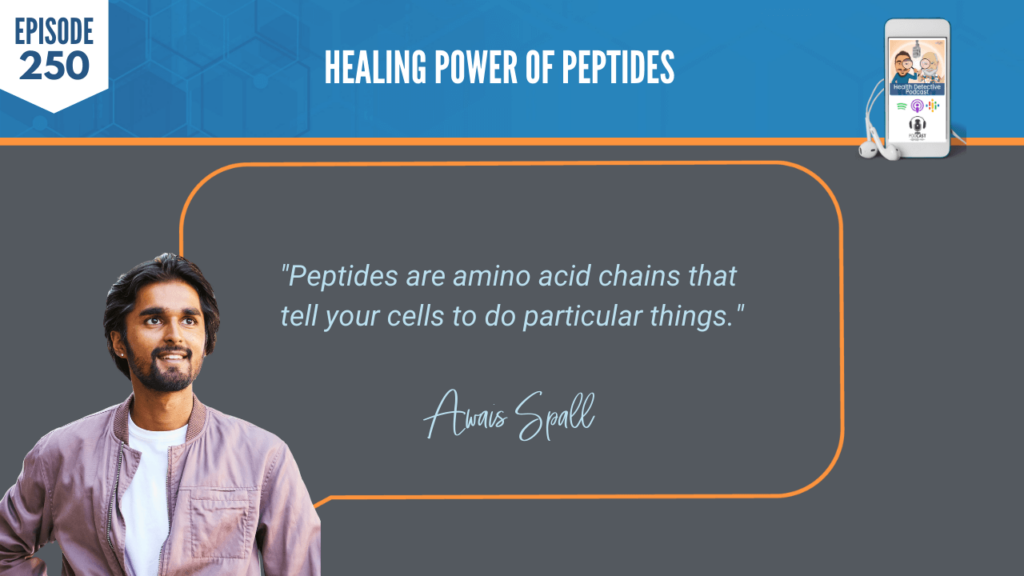
So, peptides are amino acid chains that tell your cells to do particular things. You have up to, now we know at least, 3000 peptides already existing in your body. Certain levels of peptides decrease as you age.
One of the most popular peptides is BPC-157, and that’s a gastric peptide. There’s other BPC peptides in your gastric juices but BPC-157 is the one that we have found to be the most useful. It is very, very healing for the gut; it’s one of the most powerful things we’ve discovered for healing leaky gut, for healing gastric permeability, for healing some sorts of more chronic challenges like Crohn’s disease or colitis.
Peptides: Biologics
We will even see the difference on a colonoscopy, a before and after of someone taking a BPC for four to six weeks and how dramatically it’ll heal the tissue. Some people call that the Wolverine peptide.
But in a nutshell, peptides are amino acid chains that are going into your DNA and telling it to do certain things. And they’re called biologics. That’s a very problematic term because of biologic drugs which means something slightly different. But I’m using it in the sense that you have it in your body already, these peptides. It’s not a foreign compound or substance that’s trying to shift the pathway.

Like botanicals are impacting gene expression to do certain things to kill a microbe or something like that. Whereas these already exist in your body and you’re upregulating the levels of them to tell the cells to do certain things.
[00:10:15] Detective Ev: I know this is probably a pretty broad question cause if there’s this many out there and available, we’re still studying this stuff. There’s probably a lot of different nuances here but is this one of those things where since our body already has it, you can get away with it with pretty much no side effects? Are there things that can happen when we’re using these?
[00:10:33] Awais Spall: That’s a really good question. Our data in the US is a little bit newer compared to Russia. There’s a whole deeper story of peptides and this other type of compound called bio regulator peptides that come from organs. You can listen to different podcasts on that to get the whole deep story of Dr. Khavinson, why the Russian government asked him to sort of develop this medicine. But it’s really important to know that it comes from there.
Peptides: A Few Rare Side Effects
In this question it’s important to note that sometimes we’ll look at our clinical data pools and say, well, we have X amount of information on side effects and what can happen. But it’s always important to look at the whole data pool, right? Going back to Russia and to the studies that are happening there in the Slavic world, when we talk about side effects with peptides, for the most part, we see very limited side effects. That is because of its biologically kind of like adjacent nature.
There are some side effects people will notice when they have autoimmune issues and how severe their autoimmune issues are. Now, this might sound contra indicated because peptides are also helpful for autoimmune issues. But it just depends on what peptides you’re using.
I think the ones that have become, literally in the past few years, the most critiqued now are the GH peptides, the growth hormone secretagogues that are telling the body to increase growth hormone levels at different rhythms, so people often stack two. And the idea was, well, they’re so much cheaper than actual HGH, which is pretty hard to get a hold of.
Even if you have a prescription of that, it’s pretty pricey month to month so, a lot of athletes want to do shorter rounds, gym goers want to do shorter rounds. They’re extraordinarily popular.
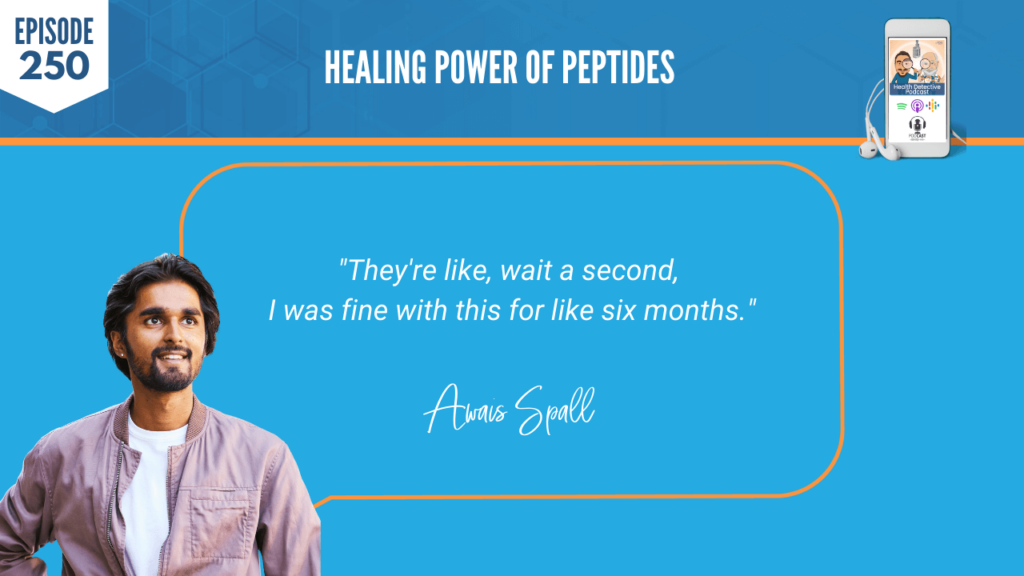
And I’m not saying that they’re bad for everyone. But we have seen certain side effects where after six months to eight months, people end up with a bruise at the injection site. And they’re like, wait a second, I was fine with this for like six months. Then every time they’re injecting, they’re like, hmm, I’m getting a little dot there or a bruise there.
Peptides: Sensitivities
Well, the body is now fighting against it, right? So, that’s one example where it’s like, it seems to work. Some people have been taking GH Secretagogues for years and they’re fine. They’re like, I feel great on this. Some people take it for six months and they’re like, okay, now my body’s reacting to it, but I got what I wanted out of it.
And it doesn’t seem like it’s a really big issue when they get the red bumps, it’s just kind of like the body’s way of saying we’ve had enough. You know, you’ve been shoving down one pathway, like this one GH pathway to increase HGH levels in the body. Let’s start exploring other avenues or we need a little break from this, right?

But then you have other sensitivities that people can have to the immune peptides, where you just want to start really slow. I’ve heard the least amount of issues with BPC, but some people will just have a sensitivity. So, just be cautious, obviously. Listen to your healthcare provider and consult with them.
But yeah, for the most part, in a nutshell, they tend to be very low side effect.
[00:13:55] Detective Ev: So, then if I’m correct from what you meant by that, let’s even take the growth hormone ones. The person was using it for the entire six to eight months. Right? Like they’re getting regular injections.
Awais Spall: Absolutely.
Detective Ev: Alright, so how short-lived are the effects then if you’re saying that some people are using these things for years, or some people are using them for six to eight months? This isn’t something that you just do one time. Does it only have a very temporary benefit?
Peptides: For Health & Optimization
[00:14:20] Awais Spall: So, the protocols can look very different depending on what you’re trying to do.
For example, I am a clinician, right? I’m helping people resolve gut issues, resolve other functional health issues to optimize their health. Peptides will play a very specific role in a health intervention like the Thymosin Alpha 1, thymulin, Thymosin beta 4, the immune peptides will play a specific role. Sometimes we’ll use the gut healing peptide, BPC Lorazitide, even TB4 fragment oral can be very gut healing as well. So, we’ll kind of use different things for different protocols.
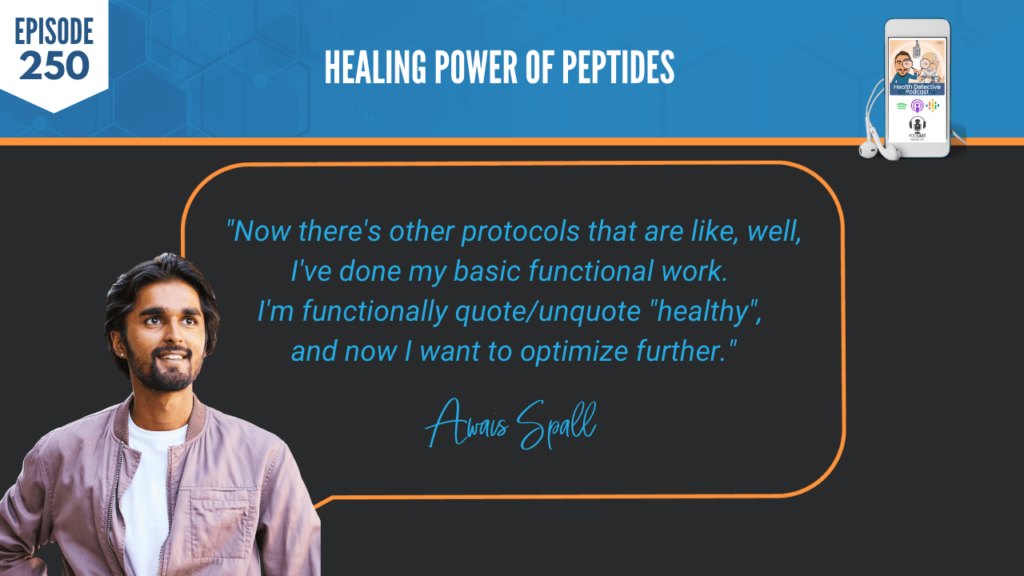
Now there’s other protocols that are like, well, I’ve done my basic functional work. I’m functionally quote/unquote “healthy”, and now I want to optimize further. So, there’s one that can sort of influence telomeres and be quote/unquote “anti-aging” in that sense. And that is this French peptide called Epitalon. People call it Epitalon. Sorry, my French pronunciation’s not amazing, so I’ll just call it Epi talon.
The protocols for that and the research for that shows that one milligram injected every day for 10 days is really beneficial every month. And you know, Natalie Niddam talks about this on her podcast. Jean-Francois Tremblay, he’s a Canadian peptide researcher and very deeply involved in the peptide space, he’s talked about this as well.
So, you know, you do one milligram for 10 days and then 20 days, you don’t do anything. You do it again for 10 days. So, you do this like three to four months out of the year. Right? This can really impact some of the anti-aging benefits. It’ll also reset circadian rhythm and have some really profound neurological effects, and actually immune system affects as well. So, it’s very popular, quote/unquote, as an “anti-aging” peptide.
Peptides: More Affordable Regenerative Medicine

It doesn’t cost a whole lot either. So, it’s like peptides allow people to access regenerative medicine without having to spend a hundred thousand dollars. That’s the amazing part of peptide medicine. Those are just some light examples, but how different the two types of peptide protocols can look.
[00:16:37] Detective Ev: Well, you have me intrigued for a couple of things. One, I do really well with this, so it’s not a huge deal. But one of the things I always kind of worried about was the fact that I had been on 20 courses of antibiotics in my life before the age of 18. You know I’m a guy of science, I’m not a PhD. There’s nothing really to say that we can a hundred percent heal this. Now, I do believe we can always get better.
I mean, certainly everything I’ve done has always been worth it. But I’m kind of like, is there not something that maybe I’ve missed? Is there not something that could have been optimized? So, I’m already thinking of that BPC-157 and I’ve actually heard of that before. I wouldn’t have even been able to tell you what it is. But I’ve seen this written out somewhere or someone said this to me, so I know that that’s a common one.
We can get to that in a second. Cause even more importantly, I’m thinking I mentioned before the podcast, it’s minor, but I have a little bit of a broken rib right now, kind of a small fracture it seems. I’m wanting to accelerate that healing. So, if I’m starting to understand this correctly, are there certain peptides out there that could be taken that might accelerate one’s healing with something like this, or am I off the mark?
Peptides: Injury Healing, Gut Healing, & Detox Abilities
[00:17:39] Awais Spall: 100%. That is the number one most popular use of peptides, both clinically, people kind of like ordering them online and doing it themselves. Which obviously, I don’t recommend something like that. But this is the reason peptides are as popular as they are, is to heal injuries.
And these stories that I will hear are just fascinating and astonishing. You know, I spoke about peptides at an event in LA last week. And this woman came up to me and she was like, I wanted to share with you that last month I had a broken femur or something like that. She was healing in a cast and her timeline that she was given was eight weeks. The doctor said that you are going to need eight weeks. And the only peptide she did was injectable, BPC. She recovered in five weeks instead of the eight weeks. So, it’s true, it’s incredible.
And that’s only one peptide, right? People usually combine BPC-157 with Thymosin Beta 4, or it’s sometimes also called TB-500, which it’s more fiber healing and then BPC-157 would be more tissue healing. So, it will support the gut healing, the gut junction healing. And there’s so many pathways through which it works on.
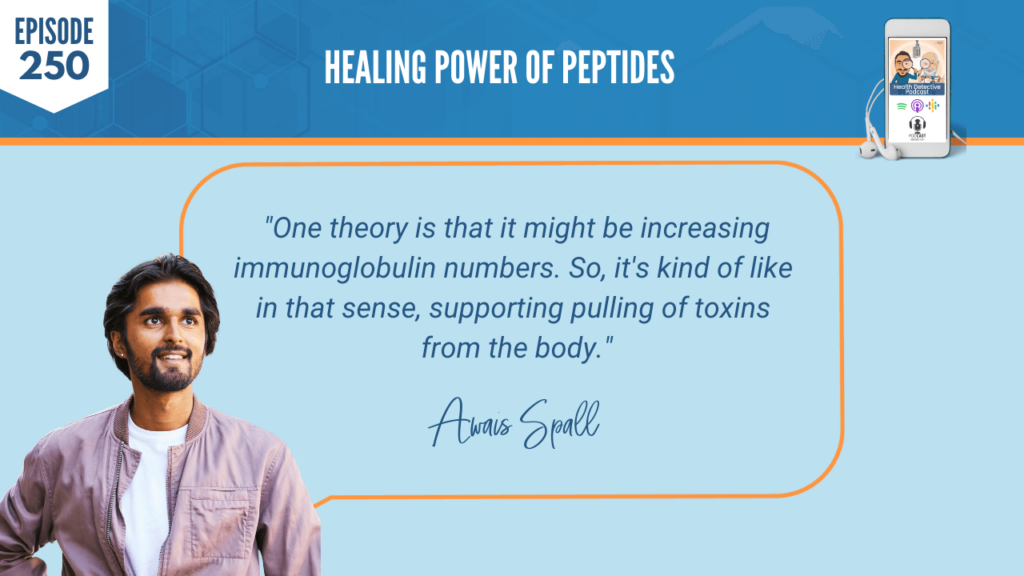
Something that’s been explored is it can also kind of like bind in a similar way that immunoglobulins bind toxins. This is even when it’s injected subcutaneously. One theory is that it might be increasing immunoglobulin numbers. So, it’s kind of like in that sense, supporting pulling of toxins from the body. That’s why it feels so good in the gut.
But for injuries, it tends to support tissue healing. It tends to be very anti-inflammatory, right?
Peptides: Painkillers Weren’t Needed
I think when we’re in functional medicine or optimization medicine, anything you call this world that we’re in, it’s just so incredible to hear these stories, right? I had a client that injured his shoulder and his doctor put him on three painkillers. He’s like, I really don’t want to take these, my gut is sensitive, hence the reason I’ve been working with you. I just am in a lot of pain, but I really don’t want to take these pain meds.
And I was like, well, I can’t advise you to not take pain meds but let’s try three peptides. Let’s try liposomal CBD and let’s try like a cocktail of things. He was like, well, let’s try the peptides first, then I’ll try other things.
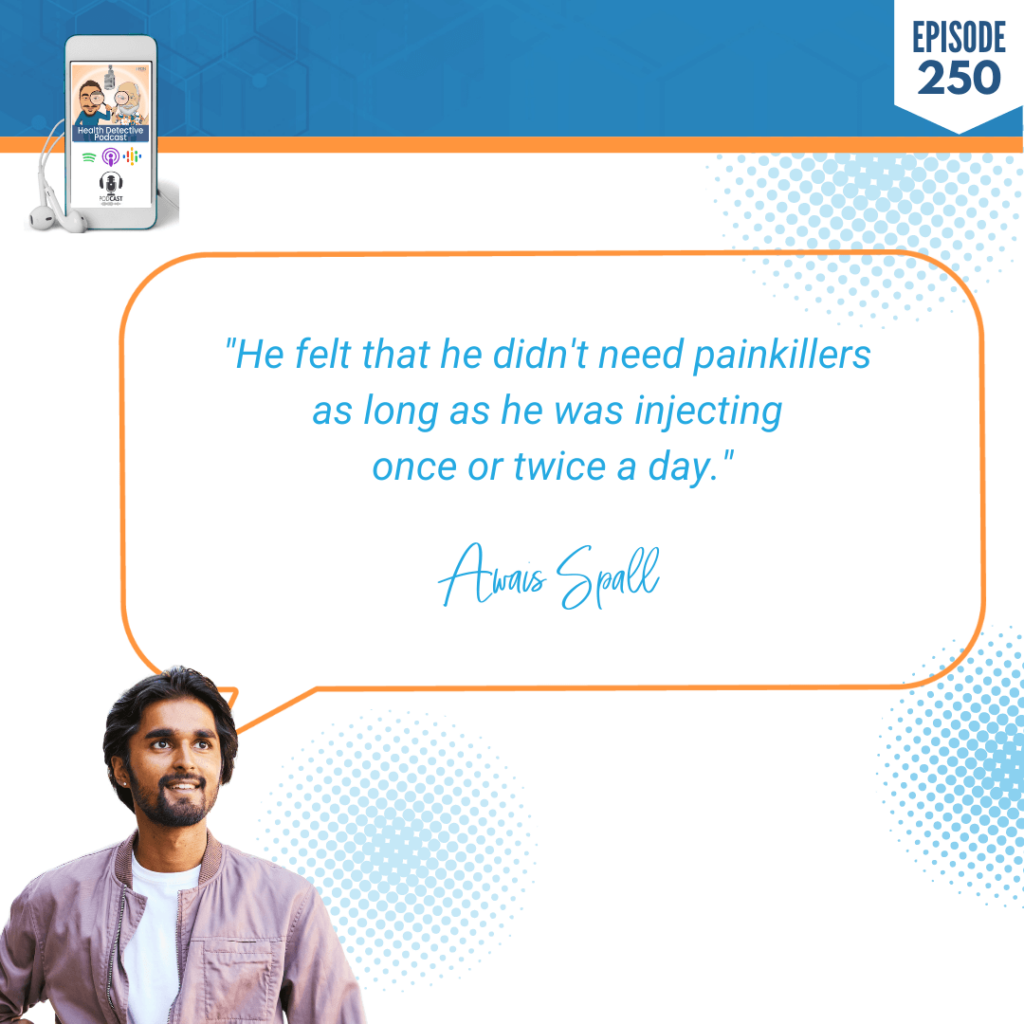
It was incredible. He felt that he didn’t need painkillers as long as he was injecting once or twice a day. The healing was so much faster. Again, it was almost twice as fast as what the doctors were expecting.
[00:20:22] Detective Ev: Dang. You’re exciting me. Especially since you mentioned that the woman with the femur thing, if that was correct, that she used the injectable BPC. This is the one that seems like is quite commonly used and seems to be like very safe, right?
You have some guts. That’s not a lame pun; I feel like you’re always willing to experiment. I use my body as an experiment. You use your body as an experiment, and you’re also very well versed with your background in chemistry. So, I feel like you know how to take more intelligent, if they could even be called risks with some of this stuff. Where I’m like, dang, I’m shooting in the dark here. I need to not go in with so much ignorance.
Peptides: Sports Injuries
But my ears are already immediately lit up when I hear, okay, I can do something that’s being commonly used, generally regarded as safe, and it could help heal this because it sucks. I just got into the martial arts like last year, and I think there’s two factors here. Because I’m really healthy, right? I do all the right things. I had that DEXA scan when I was with you in the How Do You Health Fest and my bone density is fantastic.
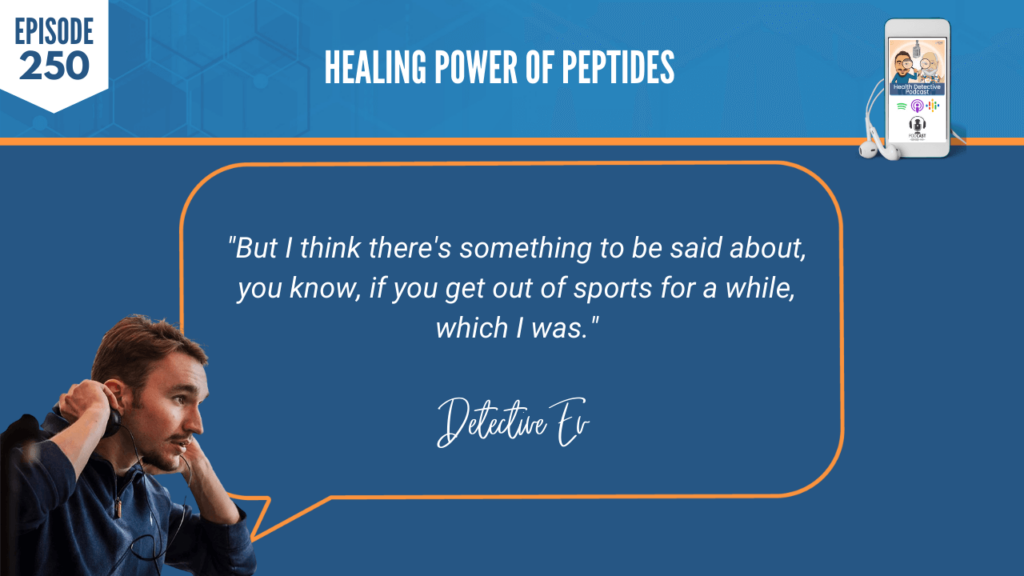
But I think there’s something to be said about, you know, if you get out of sports for a while, which I was. I shattered my foot at like 22, it was in basketball. And dude, it was just a nagging injury. Like I never got into any type of contact sport again. And I know some people would be mad at me for even calling basketball a contact sport. But I’m saying stuff that you’re bumping up against people, you’re hitting each other, you’re getting elbowed when you’re not expecting it. I think that just toughens up your body. And I had done that my whole life.
But then stopping that and coming back. I mean, it’s so stupid the little injuries that I’m getting trying to do something like Jiu-jitsu. It’s like three weeks in, first thing was elbow sprain. That lasted like six weeks. I’m like, dude, all right, here we go.
Finally get back in. Maddy, my girlfriend, love her to death. And you know, she’s not like a huge woman by any means, she’s like 140 pounds. She kneed me in the rib trying to get side control and that’s actually what did this. So, it’s not a major fracture by any means, but she did crack the rib.
Peptides: What to Expect with Peptides
So, I’m like, good. We don’t need to teach you jiu-jitsu, apparently your knees are made of steel. You just kick the guy in the rib, and we don’t have to do any of this jiu-jitsu crap. You’re good to go.
But my point is, even the teacher that we have at the gym that we’re going to, he’s been doing this for like 13, 14 years. He said, listen, your body does just seem to kind of toughen up. You’re always going to get injuries in these sports, but like the little stuff seems to go away. Like your elbow gets more flexible, right? Your ribs might harden up. Like the bones just become tougher and that’s not woowoo.
We do know that people who do Muay Thai, I mean, their shins actually get denser, right? The world champ of Muay Thai, there’s a video on this, on YouTube. You guys should check it out. They have him kicking through two wooden baseball bats with his leg. Like he’s doing this with his shin and kicking through two wooden baseball bats, which should not be done. Like I would crack my shin if I did that. And yet him, he goes right through.

So, I’m very excited cause I’m like, okay, well can I heal this much faster then? I’m guessing most of the audience is interested at this point for one reason or another. Is this something that I can go down the street and do, and I just probably don’t realize someone’s offering it? Is it super expensive? What would I be looking at? Do you have any idea how to estimate that?
[00:23:20] Awais Spall: Yes. There’s lots of doctors that offer peptides, they can write a prescription for peptides.
Peptides: Accessed in Different Ways
There’s oral versions of BPC and some of the other peptides available online that one can buy. The orals can be pretty effective for gut issues. They can be supportive of gut stuff, though my data still shows me that the injectables can be better. When we’re talking about Crohn’s and colitis, it’s pretty easy to see some of that objective data and the injectables tend to work really well for everything across the board.
But a lot of people don’t want to do injections. It’s a tiny little sub-q needle, meaning it’s kinda like an insulin needle. You’re just injecting into the fat.
Detective Ev: I can do that.
Awais Spall: You can do it, no problem. Just do it usually around the belly. You know, just grab a little piece of fat if you have any fat in the area and just put a little insulin pin in there.
It was hard for me in the beginning when I was first doing peptides many years ago cause I have a thin frame, but like, I was very thin. I had very low body fat percentage, so it was hard to find the fat to inject into. But yeah, look, there’s lots of doctors that do this.
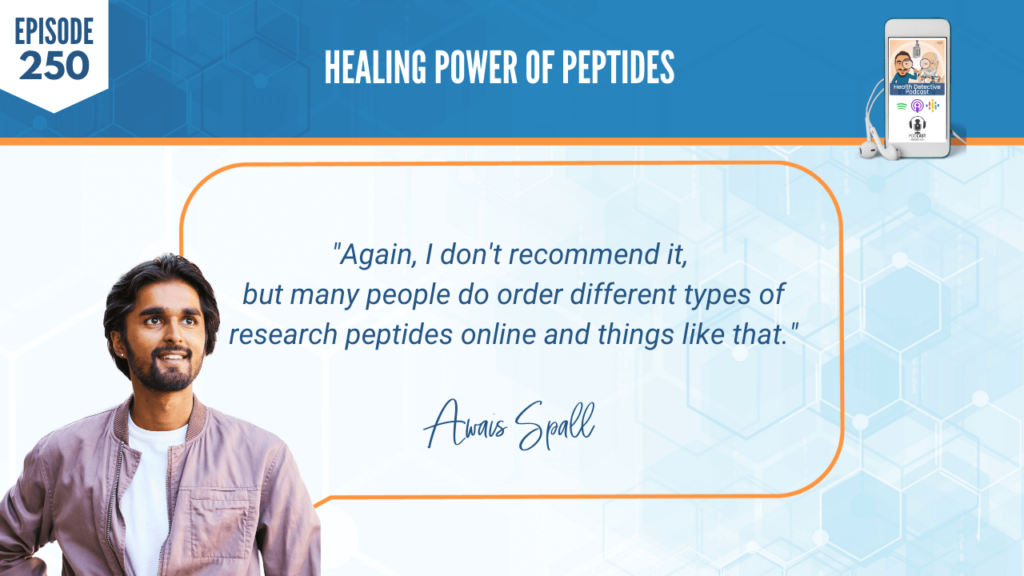
Again, I don’t recommend it, but many people do order different types of research peptides online and things like that. Which some say the quality has gone up in that sense and the sourcing is often similar to some of the pharmaceutical stuff. Even commenting on this area turns into a little bit of a legal political thing because as some peptides have become very, very effective, like Thymosin Alpha 1, which was doing wonders for people a few years ago. The FDA regulated its use and quote/unquote “banned it”.
Peptides: Additional Clinically Offered Regenerative Tools
So, then people started using thymulin, which I think is amazing and works really well. But Thymosin Alpha 1 works better, right? So, what are people going to do, right? Again, it’s not something I would stand behind, but they’re going to go online and they’re going to find ways to order it.
I would never name doctors, but I knew many doctors that were actually getting these peptides and just testing them themselves and selling them in their practices. I was talking to one of my buddies in San Diego who was doing this. And I was like, dude, you’re flying under the radar. And he is like, well, I don’t care. A lot of us decided to do this because the FDA has come out so strongly and against something that’s so good for patients that we’re going to choose to fly a little under the radar and do things a little bit in that fashion.

So yeah, there’s lots of ways to get access to them. I’m connected in the local area to lots of amazing practices and clinics that offer not only peptides, but other regenerative tools, exosomes, different types of stem cells, plasmapheresis, all these amazing interventions.
[00:26:18] Detective Ev: Okay. So, you’ve already recommended, and I appreciate that, just keeping everyone safe, like, don’t go be buying this online, especially if you’re hearing this for the first time. I’m not going to do that. I want to do this correctly. But it’s fair to say that a simple Google search might lead me to finding someone in my area that does this. Probably just haven’t heard of it cause I wasn’t looking. I might find someone that does it. What would I be looking at?
Peptides: Reputable, Safe, & Constituted
And I know this could vary so much so I don’t mean to ask such a loaded question, but I don’t even have a ballpark of the price range. Let’s say this, if I go get a red-light therapy session one off and I’m not in the membership, virtually anywhere, even in a major city, still going to be under like $60 per session for the most part. Not that it should even be that much, right?
I like the more membership model at our place, but we can at least guess what it would be before we know for sure. So, what would I be looking at for these peptides? Is this like a multiple thousand-dollar treatment for a few weeks or a hundred dollars or what?
[00:27:09] Awais Spall: Often you pay the consult fee for this, for the doctor that you’re seeing. The consult fees will range from a couple hundred dollars to, there’s doctors who only do heavier intakes and it’s $2,000, for an intake. That tends to be very elite practitioners who are doing structures like that.
But prescriptions of like BPC-157, like a month supply, 250 micrograms to 400 micrograms per shot from a reputable pharmacy, like tailor-made compounding, used to cost like $300 a month, in that range, like $200 to $400 a month. So, yeah.
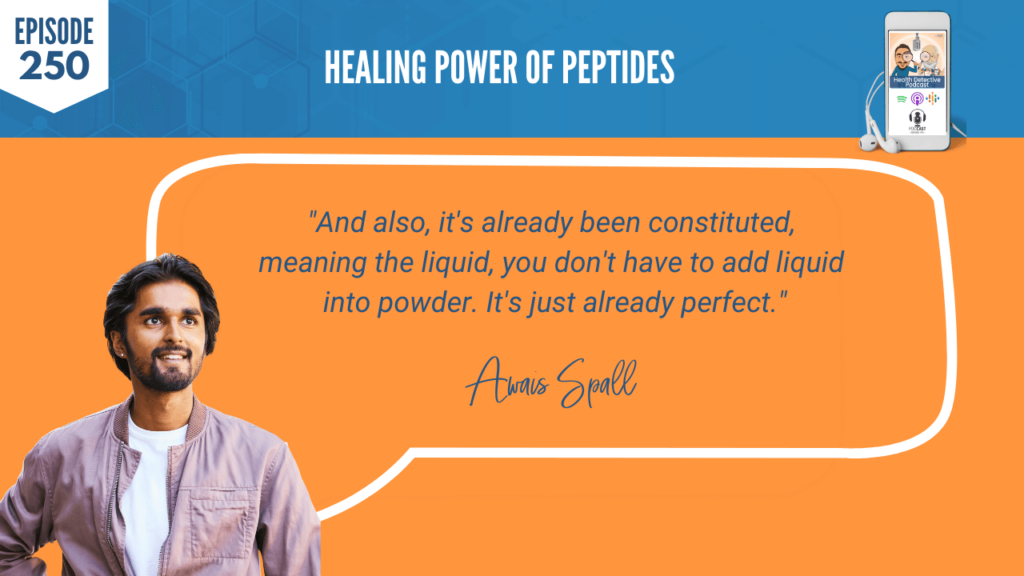
And that’s a prescription, right? That’s not people trying to go under the table and do it online. That is cheaper very often, just cost structure wise, when people do something like that. But the convenience of getting it from a pharmacy is obviously, you know, it’s reputable, it’s trustable. And also, it’s already been constituted, meaning the liquid, you don’t have to add liquid into powder. It’s just already perfect.
Peptides: Don’t Miss the Key Steps
[00:28:21] Detective Ev: Alright. Now I already have my selfish interests met, I appreciate that. And I’ll look some stuff up afterwards, see if there’s anyone local. I actually feel like there is, and I came across it a while ago; I gotta validate that afterwards.
But in terms of our listeners and what I’m thinking for them, a lot of our listeners, a lot of our practitioners, as you know, have dealt with like autoimmune conditions. You actually talked about that might be the one place this would be perhaps contraindicated, but it seems like it does more good than harm.
We have a lot of people with the chronic fatigue thing, we have a lot of people with autoimmune conditions. Let’s say they’ve been doing the right stuff. They’re doing D.R.E.S.S, which we teach in FDN. They’ve done the labs, they’re like six months into the healing. I’ve never really seen anyone not get 70% – 80% better doing the FDN program. But some people do get stuck at that last 20%. And I’m the first always to admit that on this show. Seventy to eighty percent’s great for some severe health issues, it’s worth that.
But if they’re at that lingering stage, you know our group perfectly, you are an FDN, what would you tell FDNs out there to maybe be looking into for themselves and their clients? Are there specific peptides or protocols that you’d have them start looking into or making connections with doctors for?
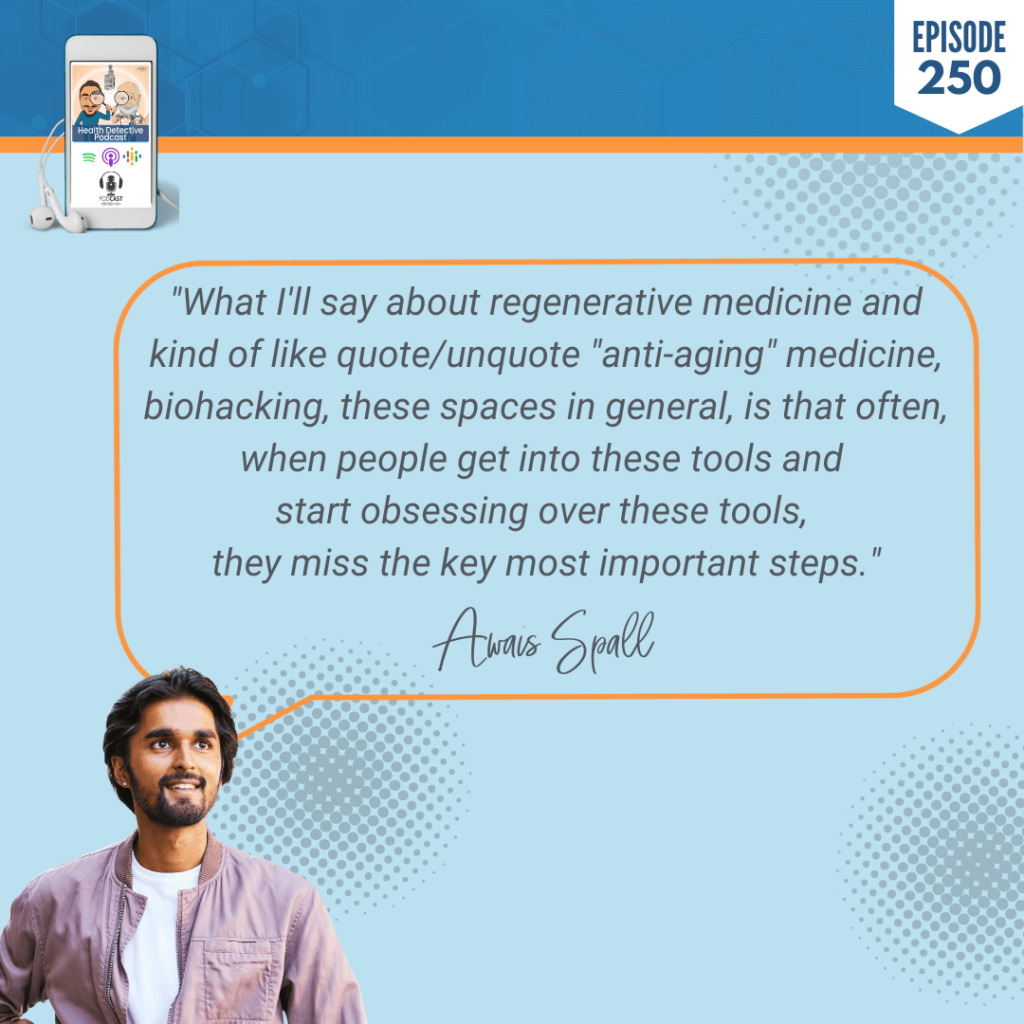
[00:29:29] Awais Spall: Absolutely. What I’ll say about regenerative medicine and kind of like quote/unquote “anti-aging” medicine, biohacking, these spaces in general, is that often, when people get into these tools and start obsessing over these tools, they miss the key most important steps.
Peptides: Do the Foundational Basics
Like you just talked about the D.R.E.S.S, you just talked about FDN, you talked about basic functional protocols, right? Are you restoring your function, are you doing the things that you need to do? If you have candida overgrowth, if you have a potential parasite, if you have dysbiosis, are you taking your antimicrobials to kill that?
I’ll get messages on Instagram, hey, I want to get X peptide to help me sleep. Can you help me get this, like DSIP, delta sleep-inducing peptide? Can you send me, or can you help me get DSIP? And my answer is, no. It’s, are you doing the things you need to be doing? Have you looked at the root causes of what could be causing this? What is your lifestyle like, right?
So, when you have these powerful medicines and these powerful sort of you know, immune modulators, people often do overlook the basics because they can, because these things are powerful. But that doesn’t mean that you should.
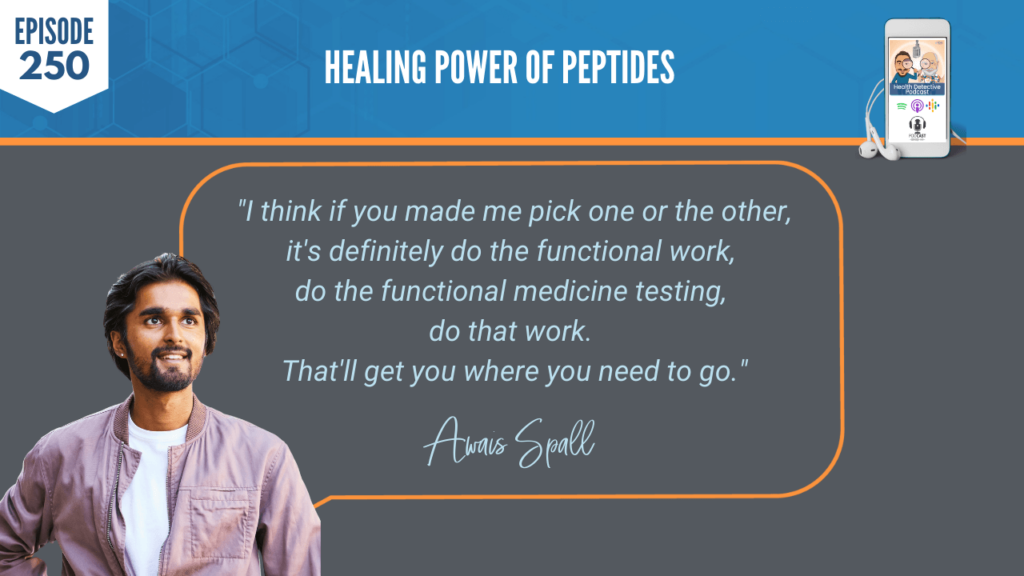
So, in these spaces often of regenerative and anti-aging medicine, the functional medicine training is actually very low and it’s very limited. So, I think if you made me pick one or the other, it’s definitely do the functional work, do the functional medicine testing, do that work. That’ll get you where you need to go.
Now, where peptides come in is they can speed up a lot of the healing. They can help you get there faster, right? And with autoimmune stuff, the whole family of thymic peptides, thymulin, Thymosin Alpha 1, you know, bio regulators like Thymagen, TB4 are really, really powerful for restoring and modulating the immune system. They’re immune modulators. They bring TH1, TH2, TH17 into balance.
Peptides: Modulating the Immune System
And we know that TH1, TH2 theory, right? It can get thrown out of balance. Not to get too deep into immunology, but there’s critiques of TH1, TH2 theory around how the immune sort of dysfunction works. But everyone agrees that imbalance does occur between different segments of the immune system and within each segment, like TH1, TH2, TH 17. Right? That’s where a lot of the inflammation is coming from. It’s like the immune imbalance of it.
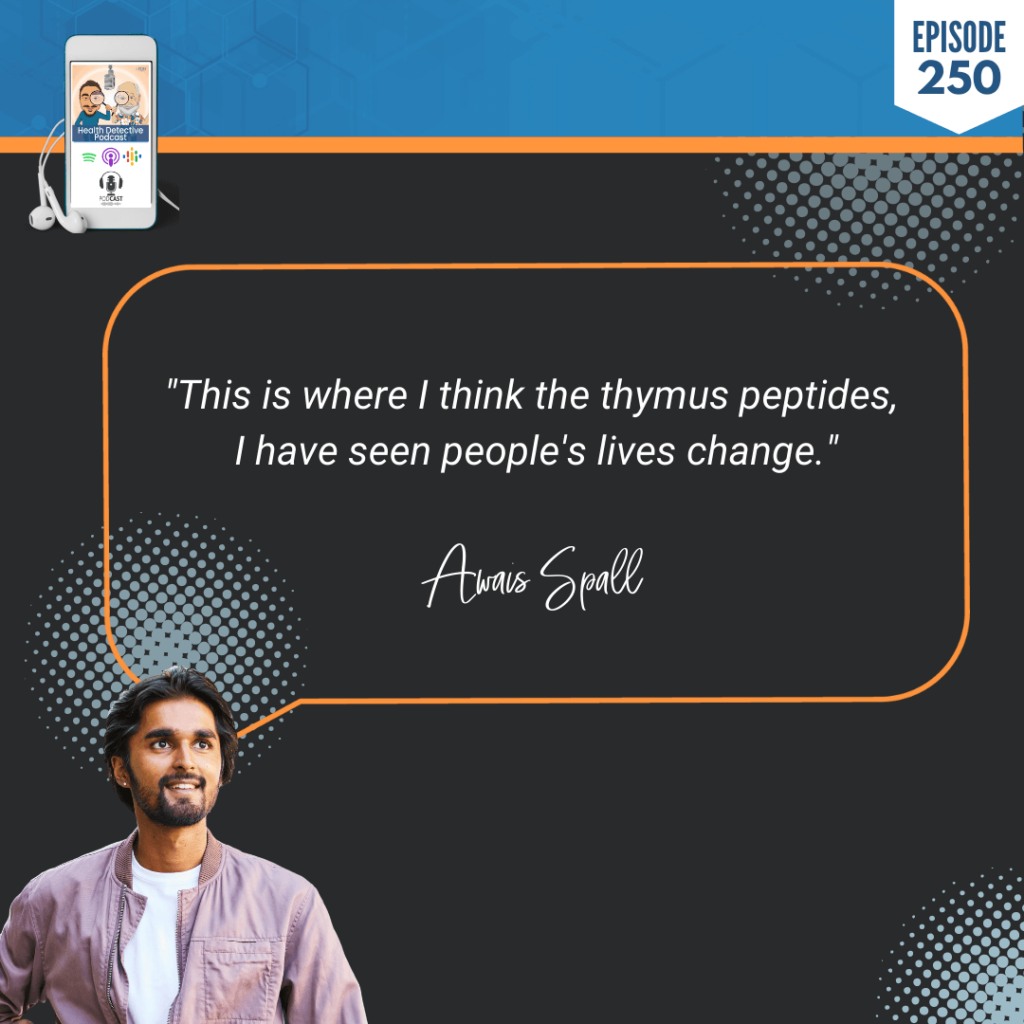
Then modulating the immune system can better prepare your endogenous immune system to create different cytokines and targeted immune factors to target certain immune threats. This is where I think the thymus peptides, I have seen people’s lives change. I’ve seen some women who were really, really struggling with viral issues and bedridden in a matter of a month, like pick up the energy to start training, to start doing Pilates.
Literally a woman became a power lifting athlete, you know, from chronic fatigue that I was working with many years ago now. And it was the thymus peptides that did that. This is before Thymosin Alpha 1 was regulated. Just absolutely incredible transformations with those. I could go on and on and list like others that could be helpful.
KPV can help modulate the histamine response and mast cell. When I’m kind of working with somebody who’s supporting someone in this process, we often find blends that we can put together of like thymulin, KPV, and like BPC, Epitalon. And the clinical data that we get sometimes shows us, like for women that are post-menopausal, epitalon can have some really powerful anti-inflammatory effects.
Well, you know, usually it’s quote/unquote, the “anti-aging peptide”. It’s the telomere peptide, right? But it can also do these things.
Peptides: Supercharging Basics with Additional Modalities
There are many ways to think about these things. But it’s the stacks we can always find to sort of supercharge someone’s protocol or their health or get them there much faster while also supporting the process of resolving hidden dysfunctions.
[00:34:15] Detective Ev: I really appreciate and find it actually interesting and validating how you always seem to still respect the philosophy of you gotta nail the basics, the D.R.E.S.S stuff.
Which if you’re listening to the podcast for the first time, it’s a trademark term by FDN. Not revolutionary in a sense, but we certainly push it like it is. It’s diet, rest, exercise, stress reduction, and supplementation. I find it cool how, again, you stay rooted in that philosophy.
That’s where we have our almost disconnect with the conversations with stuff, and I’m so fascinated to hear from you always, because you’re in what I might call like a biohacking space. FDN has been to biohacking conferences, as you know, we’ve seen each other there. One of the issues I’ve always thought that we’re having at these conferences is, many people, clearly not you, but many people that go to them kind of have that treatment mentality.
Like, you give something for this, but because it’s a biohack, oh, it’s much better. So, it’s red-light for this, it’s a peptide for that. It’s ayahuasca for this, it’s this for that always. And FDN is the antithesis of that. We don’t treat anything specifically, we’re trying to address everything in a non-specific way.
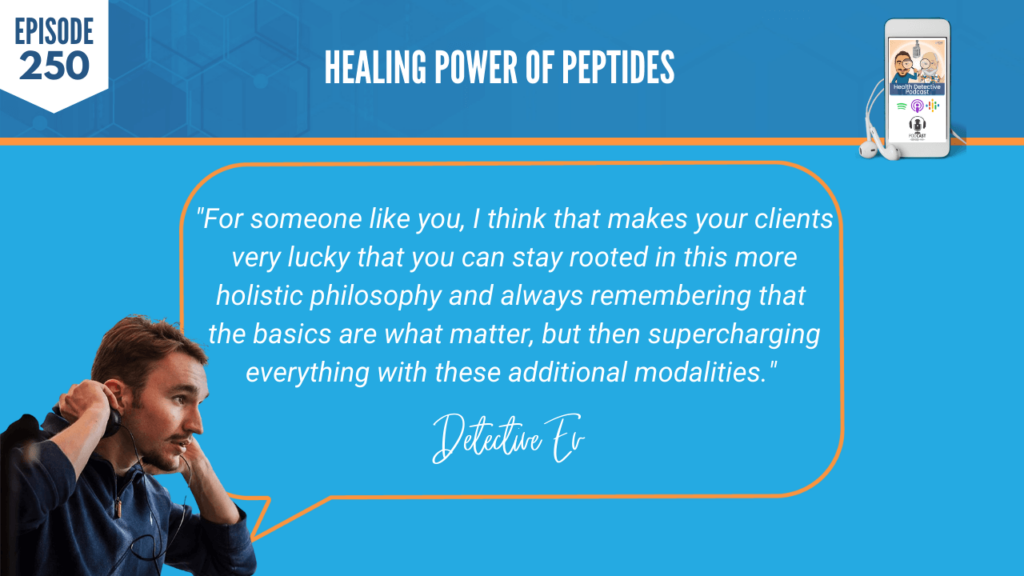
And so, for someone like you, I think that makes your clients very lucky that you can stay rooted in this more holistic philosophy and always remembering that the basics are what matter, but then supercharging everything with these additional modalities.
Peptides: The Core to Awais’ Philosophy
It kind of sounds like our FDN practitioners, and myself included, would be like the perfect candidates for these peptides because we are people that do the foundational stuff so religiously. I mean, we all have our different things. And you definitely like people and you like being out and about. But like the vast majority of FDNs, even at these dang conferences, I mean, we’re like the lamest people in the world. We’re in bed by nine o’clock, right? Like, we suck.
Remember when we were at that party at Reed’s House and it’s like going, everything’s cool. It’s nine o’clock, Reed’s like, all right, everyone shut up. We’re done. Like, we’re going to bed. And you’re like, dude, really? Like, he doesn’t mess around with that. And so, I think our people really live those principles well.
None of us do it perfectly. I have my things that I choose not to engage with. Listen, human beings can handle stress, right? So, we all choose our stress that we want to have. But I think FDN candidates are perfect for this. I wish this was actually talked about more, and it sounds very intriguing to me.
I love anything that can accelerate healing, that has minimal side effects. And it doesn’t even sound like the side effects that have been shown are severe or permanent. Like what, a bruise at the injection site? That doesn’t sound bad at all.

[00:36:35] Awais Spall: Yeah, absolutely. I think it’s a beautiful addition to good functional practice, functional health, functional medicine practice. I find it to be very, very supportive. And, yeah, that point is super core to my philosophy – get the foundations right.
Peptides: Utilizing the Old and the New
For me, it’s also another thing. We talked about it a lot last time, was like, my roots in Ayurveda, like a little bit of my grandfather’s legacy. But it’s like, you know, let’s bring the best truly of ancient medicine, of the ancient wisdom, understanding your constitution from your dosha, right? Like that’s something people find to be very helpful.
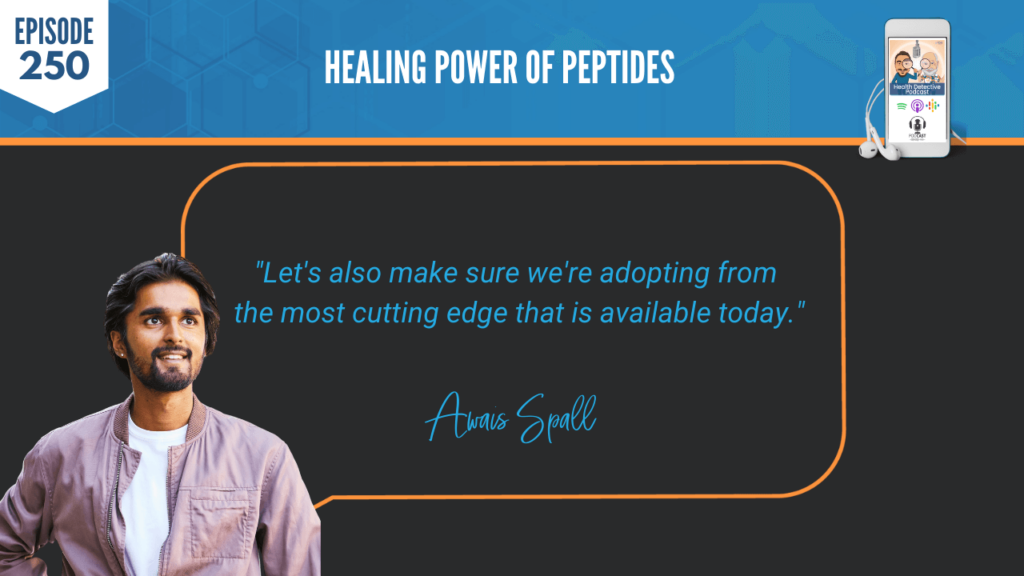
But then let’s also make sure we’re adopting from the most cutting edge that is available today. Because the challenges are also cutting edge, right? Pesticides are compounding, the levels are increasing, microplastics are increasing, the challenges are also in increasing.
[00:37:30] Detective Ev: That’s kind of where I always think about this stuff because sometimes I’m odd with things. I’m like a purist in some sense. I would not experiment in the same way that you do. Right? I experiment, but it’s a completely different way. That’s why it’s always fun talking to you cause we have such a mutual respect for each other and what we do. And yet we’re very different people in many regards. Those are like my favorite friendships.
What I’m finding is though, sometimes I have to let go of a lot of that purest mentality. Because again, today’s world, and this isn’t fearmongering, we’re being just truthful, today’s world is nothing like what the world was intended to be. And even if we stopped everything tomorrow that we’re doing wrong, which is not going to happen anyway, the world would need some time to heal. Like glyphosate doesn’t just disappear. The soil doesn’t just automatically become remineralized and everything’s fine and dandy. This stuff would take a long time to actually get back to where it needs to go.
Peptides: Intelligent Adaptions to Today’s World
I mean, I think even the US government requires for land to be labeled as organic, it needs to be seven years without the other stuff. And you know if they’re saying that, then add another seven years at least. So, like these things are going to take time before we get back to that.
Then we need to pick, alright, what kind of quote/unquote “biohacks” or “treatments” or whatever can we use that have very low risk, high reward, and we can use these things to accelerate what we’re doing. Like I use red-light therapy. The sun gives me that for free, but it also rains some days.

Now to our ancestors, I don’t think a little bit of rain would’ve hurt anything. But it’s like, my God man, I can’t even go outside cause it’s just annoying, like you’re getting poured on. And the dang rain is toxic and gets absorbed in my skin. So, it’s like, am I stupid for using red-light therapy on days that it rains? I don’t think so. Really, I think that’s an intelligent adaption to today’s world doing what I can. And it sounds like the peptides are right up there.
Awais, I wanted to ask you too, because you already kind of mentioned a really cool story, like that was incredible. The bedridden person that ends up becoming a powerlifting athlete, it sounds like. You are someone that is extremely well networked in the holistic space. This guy is hilarious to watch at conferences. He can go to every freaking booth and just be like, yo, what’s up man, and have an hour conversation. You’re just a lovable guy and genuinely interested in other people. I think that’s why you make so many friends.
Peptides: Giving the Gift of Normalcy
But my point in mentioning that part is I’m sure you have other stories, like some incredible things that have happened with these peptides. So, outside of the power lifting individual, are there some other like cool, either client testimonials or just interesting stories that you’ve heard of people really having some profound results with these peptides?
[00:39:56] Awais Spall: Absolutely. I think some of the ones with these challenging GI cases, with Crohn’s and colitis. This is where we were using some peptides like Lorazatide, which is one of the probably most powerful gut healing peptides in combination with like KPV along with obviously classic BPC and then adding in other gut healing compounds into that mix.
Now there’s many one could choose from, I’m sure people listening have their favorites – boswellia, you know, SPMs, butyrates, tributeran and things like that. So, we create this amazing sort of cocktail. And there are now quite a few people I’ve worked with that have gotten off of biologics.
Now, of course, I would never tell someone to go off of a biologic drug that is being recommended by their doctor. But many people that I’ve worked with have decided themselves that, hey, I feel like I don’t need this anymore. I don’t need Humira injections, I don’t need Skyrizi injections; I don’t want to deal with the side effects. Also, I don’t want to deal with the cost of these drugs, right?
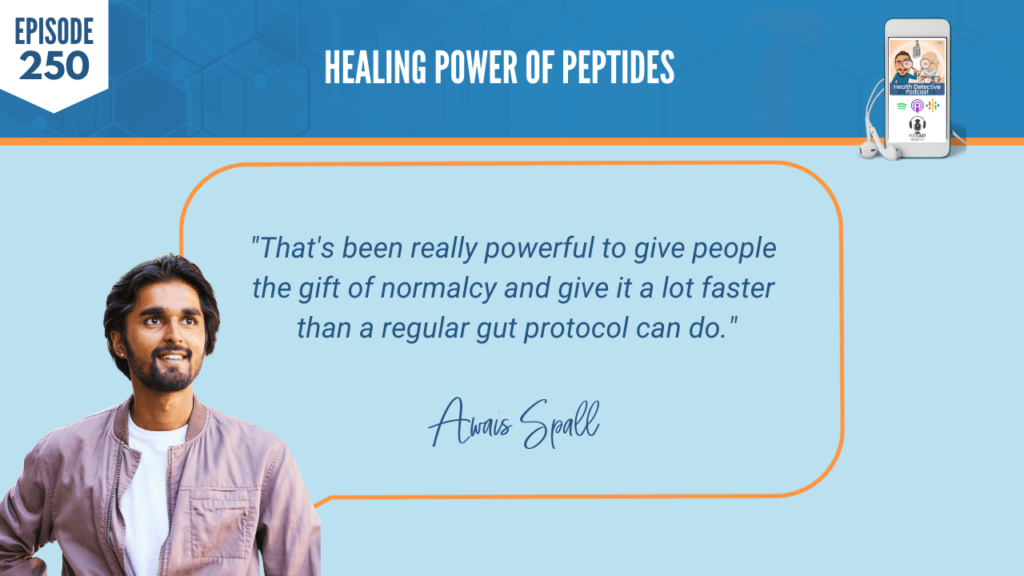
Some people, not everyone has amazing insurance so they’re paying out of pocket thousand, couple hundred dollars, or sometimes more than a thousand dollars per biologic injection treatment. So, that’s been really powerful to give people the gift of normalcy and give it a lot faster than a regular gut protocol can do.
Peptides: Rewarding Results
When someone has, for example, Crohn’s or colitis, we know that there is often inflammation coming from gut dysbiosis. Now, fully resolving that dysbiosis in my work, the style of microbiome medicine that I utilize, trained by Dr. Grace Liu, those styles of interventions that I have, we do it in phases. And we’re all seeing similar results in the fact that peptides are speeding up the results.
Like, I had a guy who decided to stop taking biologics within the first two months. He lost however much water weight and just felt like he had normalcy again, so he could go on a three-hour hike with his family, take his daughter out into the woods without having to feel like there’s some pain in his stomach. Am I going to have to run to the bathroom?

A lot of us take our different types of normalcy for granted. Someone who’s lost it, someone who’s, you know, dealing with different types of gut issues like that, like more severe gut issues, they can’t go out. If you have really severe bloating and gas or your bowels are unpredictable, you literally can’t. You are worried when you’re going out to dinner with friends or family. So, that sort of just normalcy and restoration of digestive function for me as a microbiome focused practitioner is just so rewarding to see that.
[00:43:04] Detective Ev: Well, and that leads me perfectly into our last part here. I’m like, dude, I knew 50 minutes wasn’t even going to be close to enough for us. I feel like in our normal conversations, we’re barely just getting started, you know? Like, now we’re ready to dive in.
Peptides: Awais’ Target Client
Hey, I don’t even know if you realize this or you’re just super humble, but you’re operating at such a high level with some of this stuff that I actually really do believe today is quite effective for what we typically do on this podcast. Because people are going to have to do research, I’m going to have to do some studying after this. You’ve opened up a wonderful can of worms for us.
My point is, it’s a perfect segue into talking about what you actually do. I know it’s different from when we had you last on, who is your typical clientele now? Who do you like to help? What kind of conditions do they maybe have? And not that we treat anything specifically as FDNs, but we all have our passions for certain conditions, and there’s nothing unethical or illegal about that. So, who’s your typical client nowadays?
[00:43:58] Awais Spall: It’s usually people that are very high performing. Entrepreneurs tend to fit the bill.
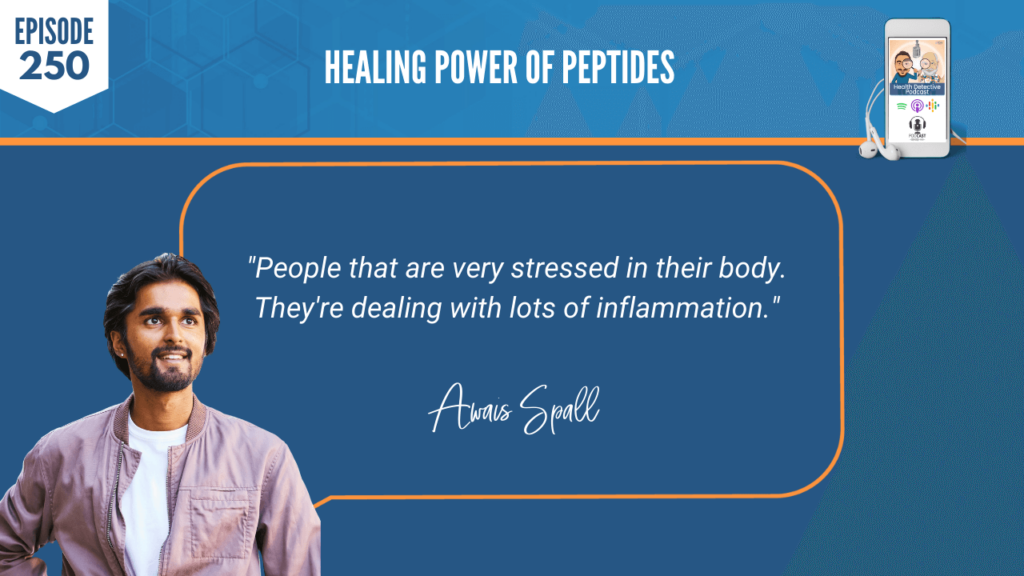
I’ve been an entrepreneur myself. I know the challenges of entrepreneurship and performing at a high level. So, I tend to work with lots of different executives or founders, or recently exited CEOs is another sort of group that often comes to me. People that are very stressed in their body. They’re dealing with lots of inflammation.
They had a successful exit, but they worked their bodies to the bone for the last seven years or something like that. That tends to be pretty common. Oftentimes, these folks are very into biohacking already and deeply involved in these spaces. They have all the tools and toys, and they’ve gone to their different regenerative medicine doctors, been wholly unsatisfied with the responses and approaches they see in terms of the functional work.
Peptides: GI Restoration and Health Optimization
It tends to be people like that, like high performing entrepreneurs.
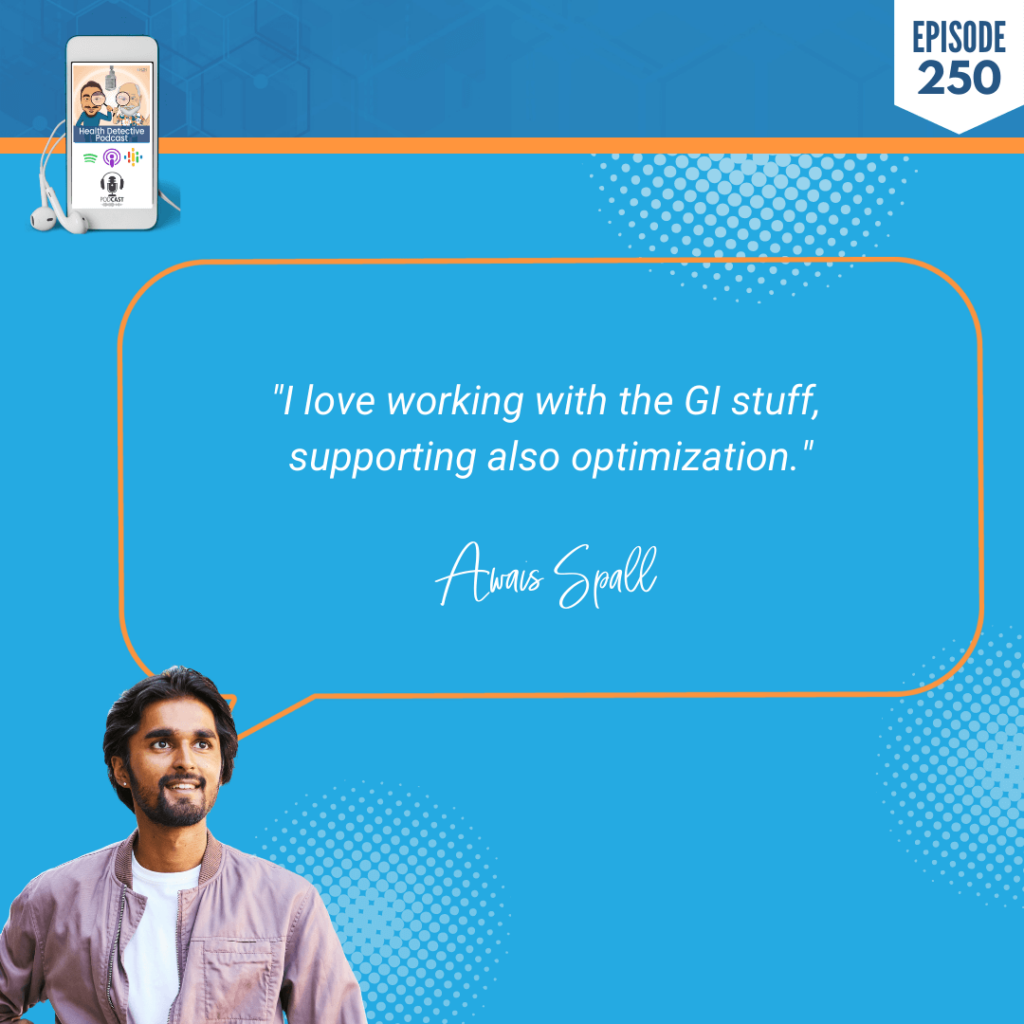
The types of things that I will look at is definitely GI stuff. I love working with the GI stuff, supporting also optimization. Optimization is kind of like in FDN we talk about like this is disease, then you have health, and then you have like optimal beyond that.
Obviously, Reed talks about it a little bit differently. But there’s a state where people come to the absence of symptoms and the absence of like disease, but that’s not optimal. Optimal is a state beyond that. You know? The way you live your life, Evan, you seek to be optimal in terms of training, athletics, performing at the highest level, eating and everything like that, right? So, that’s the way we see that.
Some people will come to me and they’re like, hey, I could fix this, or I could fix that, but I just kind of want to look under the hood of the car, see what’s going on there. Get a checkup, do a full functional assessment, and then like, really optimize from there. Take it to the next level. Know that I’m not only being preventative, but feeling better than I am currently feeling cause I know there’s a level beyond this. So that’s amazing.
And I think a lot of this work in utilizing these advanced tools is redefining what’s possible. Like, I’ve had this happen to my gut and I’ve had this thing happen. And I’m reading that nothing is possible. Or I’m reading that I’m only supposed to be able to get this much better or this much better. Well, if we come to that, that’s okay. But let’s try to just think outside the box, use all these advanced tools.
Peptides: The Disconnect
And there’s so many advanced tools that I haven’t even mentioned. Peptides are my favorite canon, but there’s a ton of different modalities and interventions one can use. Let’s just see what is possible. That’s the question that, the frontier, that optimization medicine is at right now.
[00:46:55] Detective Ev: We don’t have too much time to get into it, unfortunately, but I love the way that you worded that because it’s something that actually seems to be a fairly common theme for people. We come into this space cause we’re forced to, we have these health symptoms, we never asked for this, and now we’re dealing with that.
But you worded it perfectly. Like you have the absence of symptoms, but that doesn’t mean that you’re at optimal yet. You can get to this middle ground, that’s a hundred percent true. It has to go that way actually, if you want to get to optimal.
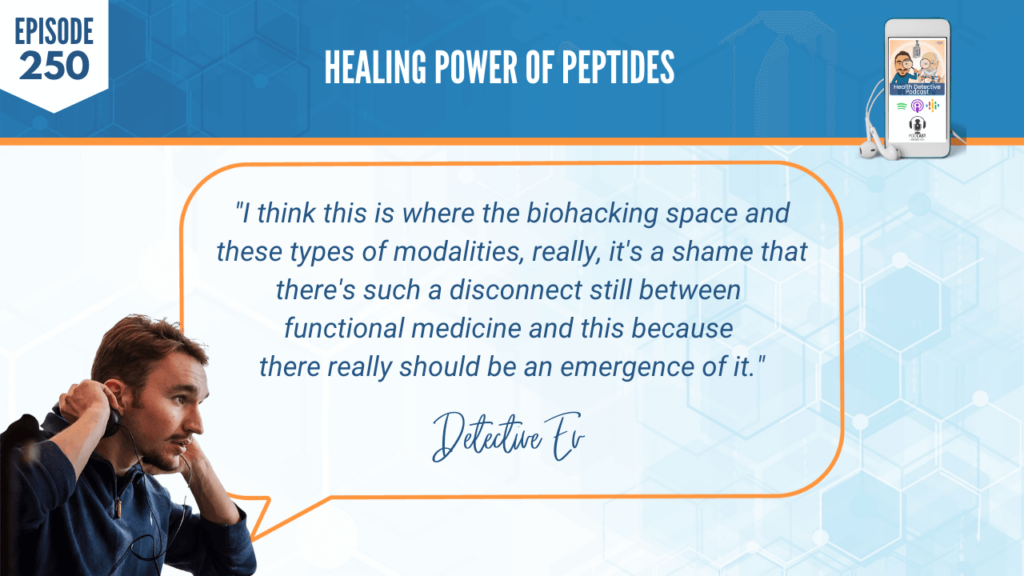
And then I think this is where the biohacking space and these types of modalities, really, it’s a shame that there’s such a disconnect still between functional medicine and this because there really should be an emergence of it. But right now, it’s separated.
I think when I go to these biohacking congresses, I hear crazy health stories sometimes. But a lot of the times I hear top level athletes, I hear serial entrepreneurs that felt run down. It’s like, well, of course, dude. You work like 90 hours a week. And they’re like, no, I want to work 90 hours a week. I’m going to do everything I can to still do that. Whereas FDN, I mean, it is par for the course. You rarely find a graduate who has not been through something serious health wise.
Peptides: I Want to Optimize!
So, that’s kind of the differences between the two spaces and who they attract. And they really shouldn’t be different.
It should be different levels to this. And once you get healthy, I think, even if you’re not a crazy work head like myself, one thing that is universal here is that you want to go share this with other people. So, there’s a pleasant irony in all of this. You go from someone who like really can’t work that much or work feels like heck every time cause you’re so dang sick. And now for the first time you might be doing work that you’re passionate about, and my gosh, it’s all you want to do. It’s like literally what others look at as work, you’re like, this isn’t work. I’m having fun, I want to share this with other people.
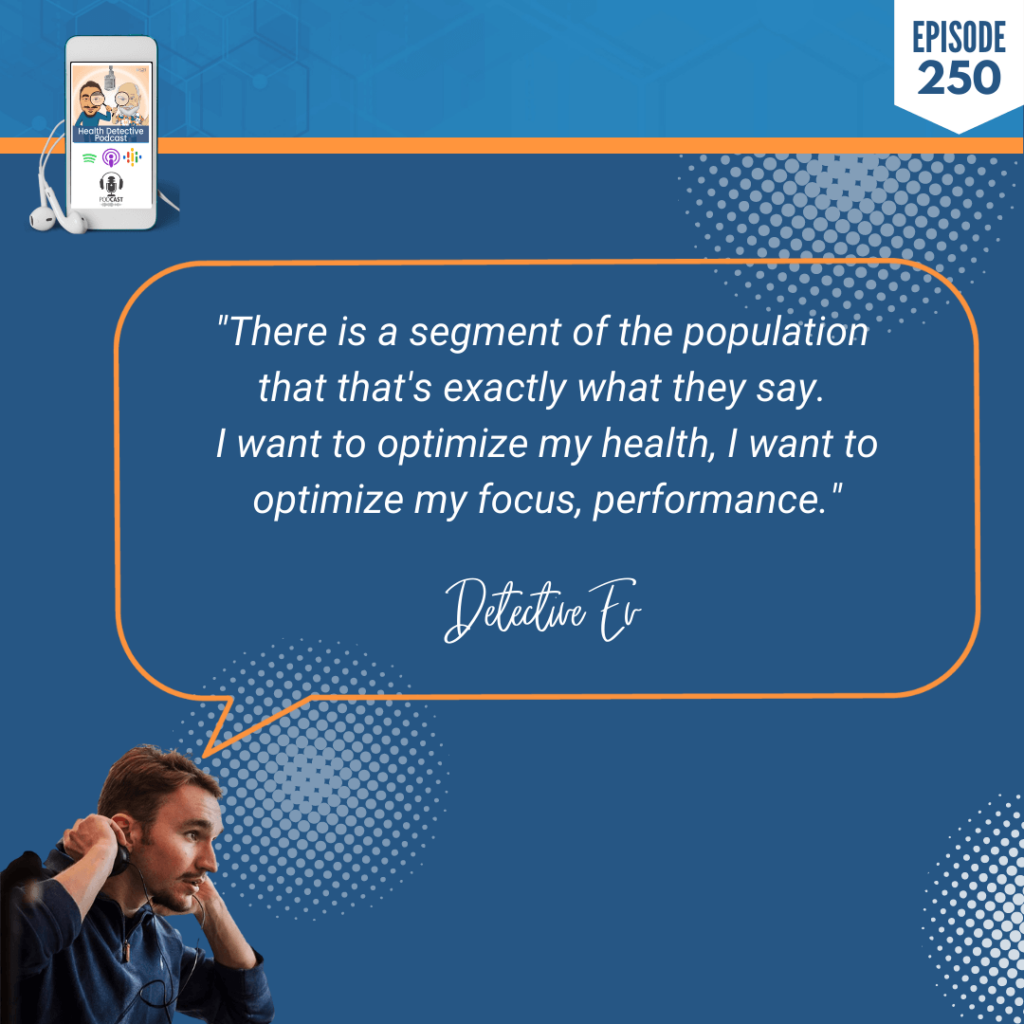
So, I like that you mentioned that. Because the marketers will say, no one says optimization. It’s like, well, no, that’s not true. The average chronically ill person doesn’t say optimization. There is a segment of the population that that’s exactly what they say. I want to optimize my health, I want to optimize my focus, performance. That’s the words I use a lot of the times nowadays that I feel better.
So, where can people find you if they heard this today and they’re like, all right, well, I’m definitely this guy’s target person. I’m someone who has that kind of entrepreneurial background or high-performance background. I’d love to get these recommendations.
Where to Find Awais Spall
Cause guys, I can’t stress enough. And if you listen to the podcast regularly, you know I speak highly of all the guests. But Awais has such a crazy knowledge base that I know that you can help almost anyone, even if they weren’t a high performer or at the very least, you’re going to refer them to the person that can.
So, where can they find you if they’d like to work with you?

[00:49:25] Awais Spall: You can find me on Instagram. You could literally shoot me a DM and I’ll send you my link to schedule. You can also use my website. The photos could not be more outdated. I look like a different person on my website. But yeah, you can use my website and there should be a scheduling link, still active there and you can do that. But yeah, I’m pretty discoverable and you can engage with me.
I have a very small sort of like wait list right now. But I love to be able to serve as many people as I can. As I get to do different types of work in the space, consulting healthcare companies and even supporting like manufacturing and production of some of these things, I really find that I love the one-on-one work with people and just helping people one-on-one figure these things out, like get that understanding that they need. So yeah, I’m pretty accessible.
[00:50:25] Detective Ev: Thank you for coming on today, man. I’m looking forward to seeing you at whatever next conference we’ll end up at together.
[00:50:29] Awais Spall: Good to be here, Evan, and I’m sure I’ll see you soon.
Conclusion
You can always visit us at functionaldiagnosticnutrition.com. Our Instagram handle is @fdntraining.
For more informational and functional health-oriented podcasts like this one, go to functionaldiagnosticnutrition.com/health-detective-podcast/.
To learn more about us, go to functionaldiagnosticnutrition.com/about-fdn-functional-testing/.

